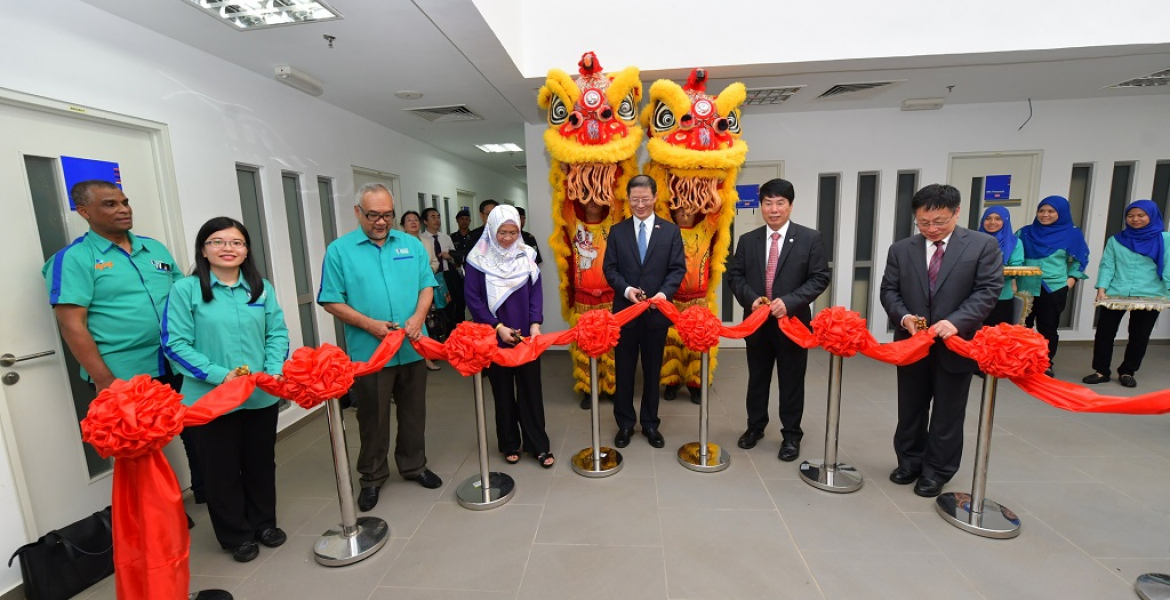Official Launching of UMP Confucius Institute
The launching of Universiti Malaysia Pahang (UMP) Confucius Institute (CI) reflected the university’s serious effort in providing education and training in technical and vocational (TVET) in a Mandarin learning setting.
CI’s role is not only limited as a Mandarin language institute but also one that provides the syllabus to teach and learn the language for TVET.
By being graduates who can speak several languages, this will give them added values and better prospects of being hired.
The institute was officially launched by Education Ministry’s Policy Planning and Coordination Division Secretary, Normah Osman at UMP Pekan on October 14, 2019.
Also present were UMP Board of Directors’ Chairman, Dato’ Sri Ibrahim Ahmad, UMP Vice-Chancellor, Professor Ir. Dr. Wan Azhar Wan Yusoff, People’s Republic of China Embassy Cultural Director in Malaysia, Feng Jun, Hebei University Vice-President, Professor Dr. Shen Shigang, China’s Confucius Institute Director, Professor Gui Fuliang and UMP Confucius Institute Director, Yong Ying Mei.
According to Professor Ir. Dr. Wan Azhar, the institute would provide the internationally-certified Mandarin-Hanyu Shuiping Kaoshi (HSK) fluency test to all Malaysians and training services to teachers.
“It would also serve as a research centre for teaching materials”, he added.
He also said UMP had set up a Mandarin Language and Culture Centre (MLCC) eight years ago and organised various Mandarin courses and Chinese cultural activities for UMP staff and local community including government agencies, private sector and industries so much so that it had become a major reference point on matters related to Mandarin language and Chinese culture in the East Coast.
On the support given by the Education Ministry, Confucius Institute Headquarter (Hanban) and Hebei University on the establishment of UMP CI, Professor Ir. Dr. Wan Azhar said it was indeed a meaningful recognition to all of the university staff.
“This would further enhance efforts taken in expanding potential international cooperation, with UMP CI continue to remain relevant and provide added values to students and others as well,” he added.
He said UMP CI would also play a role as a service provider for exchange student programme to universities in China, a platform to provide them the exposure and experience in culture and daily living practices as students in a foreign country and the opportunity to get involve in various activities with locals.
Feng Jun also said there were 530 CIs in 155 countries and regions in the world including Malaysia with the first CI established in Universiti Malaya (UM) which was now already into its tenth year.
He said they were confident that with the good ties enjoyed by China and Malaysia, it would bring about mutual benefits in the fields of education and culture, especially so with the year 2020 to be announced as the Tourism and Cultural Year in China.
Normah, in her speech, said the ministry truly welcomed efforts taken by UMP and Hebei University in setting up the Confucius Institute as it would give more added values to the university, its community as well as the society.
She hoped that CI, being a centre of knowledge, would be extensively presented so its importance would be widely known especially among students and the people.
She added that this could be implemented by organising programmes such as cultural exchange activities for these initiatives would not only strengthen knowledge in the fields of science and technology but could also help generate economic activities between the two countries.
“I believe UMP, being a technical university, will be able to create opportunities from the establishment of this institute through sharing of technical expertise and transfer of technology, knowledge, development and research, as well as commercialisation of products that will benefit both countries.
“This will also make Malaysia an international education hub and so, more efforts should be taken to boost student and staff mobility programme,” she said.
Normah said there were three other CIs in Malaysia - UM, Segi University and Universiti Malaysia Sabah (UMS).
UMP also organised the Malaysia-China Cultural and Arts Festival involving students from Hebei University who presented various performances showcasing the Chinese heritage such as the Chinese calligraphy and paintings, a lion dance and martial arts – Taichi and Wushu.
A forum was also held that discussed about the many aspects in educational and cultural exchange activities.
- 362 views



 Reports by:
Reports by: 






